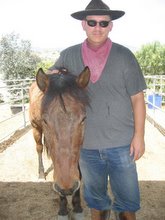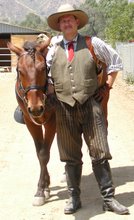My equine class at Pierce College has been interesting and there's been a lot of interesting information put out- the instructor is a real treasure trove. Definately instructive.
Last night we went into breeding operations and dealing with stallions. The two things I went away with were:
1. If you keep a stallion, YOU HAD BETTER KNOW WHAT YOU ARE DOING!
2. Breeding is a crapshoot and you had better be ready to lose money. A LOT OF MONEY.
I pesonally have no interest whatsoever in breeding horses but it was very instructive and I learned a lot that I just had never thought about before. Personally, unless you're breeding, there's no reason to keep a stallion around and you're a potential hazard to everyone around you. NONE. Period.
Of course, the way we handle breeding in many respects runs counter to how it's done in the wild (yes, the basic act remains the same but everything else isn't). It's amazing how we've bent the horse to meet our requirements, especially when money is on the line. What's also striking is that in many ways, it's like rolling dice- you can get your mare bred to a suitable stallion, wait 9 months and then have the foal die on birth or be born with some defect that pretty much renders them useless. And now you're out a lot of money for board, vet bills, etc. and nothing to show for it. Sure you could get a refund on the stud fee but still...
On the other hand, since we've recently had some foals at the stables, it's interesting because I now know a more about the theoretcial basis for why certain horses are bred and I can see it in action- theory and reality. Foals are always cool to watch, no matter what. :-)
In these poor economic times, it really makes little sense to breed unless we're talking about race horses or something else that's high-dollar. People are literally giving them away or abandoning them and there's basically too many horses out there (I'll save the horse slaughter issue for another day). Not good.
It's also amazing just how much money is tied up in breeding operations, especially in the Thoroughbred industry and especially in Kentucky. I spent three years in Kentucky courtesy of the Army and I made regular trips to Lexington but it never really registered before. It's making a lot more sense now although I seriously doubt that I'll ever get mixed up in it (got a few million you can give me to try it out? :-)).
We'll be taking a field trip out to Santa Anita race track next Saturday so that will be a chance to learn how the foals are eventually put to use.
You learn something new everyday...
Last night we went into breeding operations and dealing with stallions. The two things I went away with were:
1. If you keep a stallion, YOU HAD BETTER KNOW WHAT YOU ARE DOING!
2. Breeding is a crapshoot and you had better be ready to lose money. A LOT OF MONEY.
I pesonally have no interest whatsoever in breeding horses but it was very instructive and I learned a lot that I just had never thought about before. Personally, unless you're breeding, there's no reason to keep a stallion around and you're a potential hazard to everyone around you. NONE. Period.
Of course, the way we handle breeding in many respects runs counter to how it's done in the wild (yes, the basic act remains the same but everything else isn't). It's amazing how we've bent the horse to meet our requirements, especially when money is on the line. What's also striking is that in many ways, it's like rolling dice- you can get your mare bred to a suitable stallion, wait 9 months and then have the foal die on birth or be born with some defect that pretty much renders them useless. And now you're out a lot of money for board, vet bills, etc. and nothing to show for it. Sure you could get a refund on the stud fee but still...
On the other hand, since we've recently had some foals at the stables, it's interesting because I now know a more about the theoretcial basis for why certain horses are bred and I can see it in action- theory and reality. Foals are always cool to watch, no matter what. :-)
In these poor economic times, it really makes little sense to breed unless we're talking about race horses or something else that's high-dollar. People are literally giving them away or abandoning them and there's basically too many horses out there (I'll save the horse slaughter issue for another day). Not good.
It's also amazing just how much money is tied up in breeding operations, especially in the Thoroughbred industry and especially in Kentucky. I spent three years in Kentucky courtesy of the Army and I made regular trips to Lexington but it never really registered before. It's making a lot more sense now although I seriously doubt that I'll ever get mixed up in it (got a few million you can give me to try it out? :-)).
We'll be taking a field trip out to Santa Anita race track next Saturday so that will be a chance to learn how the foals are eventually put to use.
You learn something new everyday...










2 comments:
Totally agree (with the comment about you better know what you are doing). Studs at endurance races are usually VERY well behaved. I got to meet one that wasn't at my last race, while I was riding a mare in season. I could NOT believe what the rider was allowing him to do undersaddle and I got away as quick as I could.
I've never had a interest in breeding. I never understood why I would breed when I can get a perfectly good adult horse off the market with basic training for often less than the stud fee would be (not to mention, vet, boarding, training, time, luck, fate.....).
Very true. And to show just how bad it is, I was riding along a street last week and had a lady pull up and offer me an 11 year old Hunter-Jumper for free. I had to politely refuse, tempting though it sounded (Max already eats all my money).
Way too many good bargains out there with extensive training.
Post a Comment